This article came up on Slashdot today.
“Claims by the MPAA that illegal downloads are killing the industry and causing billions in losses are once again being shredded. In 2009, the leading Hollywood studios made more films and generated more revenue than ever before, and for the first time in history the domestic box office grosses will surpass $10 billion. … [N]either the ever-increasing piracy rates nor the global recession could prevent Hollywood having its best year ever in 2009. With an estimated $10.6 billion in consumer spending at the US and Canadian box office, the movie industry will break the 2008 record by nearly a billion dollars.”
They reference a TorrentFreak article claiming that domestic box office numbers are higher than ever — and, therefore, movie piracy isn’t having any effect:
Claims by the MPAA that illegal downloads are killing the industry and causing billions in losses are once again being shredded. In 2009, the leading Hollywood studios made more films and generated more revenue than ever before, and for the first time in history the domestic box office grosses will surpass $10 billion.
Those despicable Hollywood liars. Additionally, these kinds of stories seem to be an annual occurrence (What piracy crisis? MPAA touts record box office for 2007, What piracy? Movie biz sees record box office in 2008).
 But, I don’t consider TorrentFreak to be a reliable source, and expect a big dose of spin coming from them. Too bad they didn’t provide any statistics so that we could see the trends. That’s okay. I will. Shown on the right are the total domestic (US and Canada) box office numbers, according to BoxOfficeMojo. The dollar amounts are in millions. (Hollywood Box Office, the original source for the $10.6 billion estimate has adjusted their estimate downward to $10.5 billion.)
But, I don’t consider TorrentFreak to be a reliable source, and expect a big dose of spin coming from them. Too bad they didn’t provide any statistics so that we could see the trends. That’s okay. I will. Shown on the right are the total domestic (US and Canada) box office numbers, according to BoxOfficeMojo. The dollar amounts are in millions. (Hollywood Box Office, the original source for the $10.6 billion estimate has adjusted their estimate downward to $10.5 billion.)
Okay, you might see some trends here. There’s some pretty strong growth from 1980 until around 2002. Then, after 2002, the box office revenues hover between $9 billion and $10 billion a year.
Let’s take a look at those numbers in chart form. Strong growth up until around 2002, then some leveling off. But, the movie industry is still growing, right?
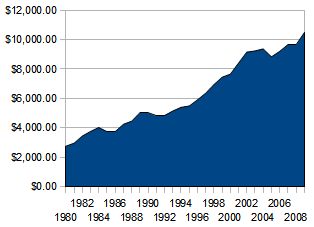
Well, if you consider that inflation is around 4%, you start to wonder if the movie industry is keeping up with inflation. What happens if we take a look at these same numbers and adjust for inflation using the Inflation Calculator?
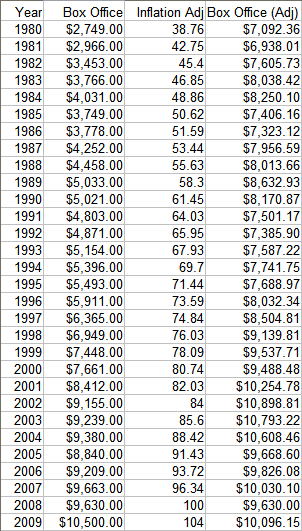
This chart shows the inflation adjustment in the third column and the Inflation-Adjusted (2008) domestic Box Office numbers in column four. Once you take the inflation adjustments into account, you can see that 2009 wasn’t the best year ever. The best year ever for the movie industry was 2002. If box office revenue reaches $10.5 billion this year, after adjusting for inflation, it will be the fifth highest year, behind years 2001-2004. Here’s a chart of these numbers:
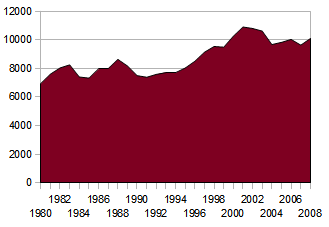
Once inflation is taken into account, the 2009 box office numbers are about 9% lower (or $0.8 billion) than 2002 numbers. (Hm, that’s a few years after music industry revenues also peaked*.) On average, movie box office revenue increased by $177 million/year between 1980 and 2002. Then, on average between 2002 and 2009, it has declined by $114 million/year. Yes, this could be a short term dip in revenue (like the slump in the early 1990s), but had revenue grown at the same rate between 2002-2009 as it had between 1980-2002, revenues would be $2.0 billion (20%) higher in 2009.
If we wanted to go one step further, we could also point out that the US and Canadian populations have grown from 227 million and 24.5 million in 1980 to 305.5 million and 33.9 million in 2009, an increase of 35%. Based on that, we can see that the movie industry’s growth in the past 30 years has been based on population growth. Per-capita spending has fluctuated a bit, and has declined by 14% since 2002.
Per-capita inflation-adjusted domestic box office:
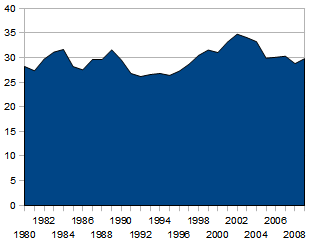
It’s not a horrible downturn, and it is similar to the decline seen in the early 1990s, but it’s also not an argument that piracy isn’t hurting the movie industry, nor is it “shredding” the claims that movie piracy is “causing billions in losses”.
I should also point out another interesting bit of spin. The Ars Technica article linked at the top says: What piracy? Movie biz sees record box office in 2008. Looking at that headline, it looks all wonderful for the movie business, doesn’t it? But, once you look at the inflation-adjusted numbers, you can see that 2008 numbers ($9.63 billion) were the worst numbers since 2000, and per-capita spending was the worst since 1997. Funny the tricks you can play when you don’t adjust for inflation.
* Graph of the music industry downturn since 1999:
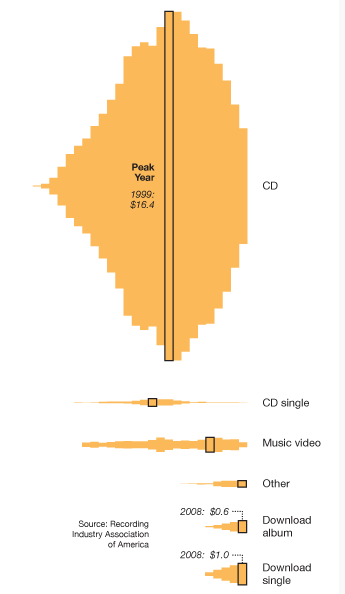
Hi,
I’m sure downloads of music and video are occuring at a great rate. I’ll ask the question, though. Who would want to buy a cd when you can’t play it in your computer? Who would want to put a cd in the machine when the song or video can reside on the computer? Who would want to buy a cd to put in your computer knowing that it will cause your cd or dvd player to cease to be seen by the machine? Who would ever trust Sony again? Would the pirates ever pay for the software if they were unable to download it for free. I contend the answer, at the least, is not obvious. Why would artists of any kind want to create animosity with their genuine customers by swatting them with anti-piracy attempts? Can you download most of the drm’d stuff anyway if you want to and will take the risk? You might say that the risk puts people off downloading software, but it doesn’t put off the pirates targetted. If much of E*rope and Ch*na is unlikely to ever pay for software because it’s against their lack of principles, lack of finances or both, they shouldn’t really be included in the statistics. If they are included in the statistics, please leave the others out, they are insignificant.
I bought Empire Deluxe at least 3 times, scenarios at least twice, and it was my favourite software for a very long time. I have not bought your program yet even though it greatly appeals to me, especially the wego. I am going to buy it soon for the reasons that I’ve just said. But I’m not going to buy multiple copies as I normally would, and it will carry a taint with it.
Please consider converting your game to serial number protection only, as the years go by. Battlefront shouldn’t be doing this to its customers. I would greatly appreciate it. Thanks. Greg
I guess I’m not clear on what you’re saying. I have lots of CDs that I’ve ripped to mp3 format, and I pretty much only buy music via iTunes downloads.
By the phrasing of your question, I assume your answer is “noâ€. Personally, I don’t treat pirates as a monolithic group. There’s a diversity of people, ranging from poor college students downloading everything just to try it to employed people who pirate because not paying is always better than paying. I know at least one person who has changed from a paying software customer to a huge piracy fan (once he discovered how to pirate). He thinks the idea of paying for anything (like he did a year earlier) to be absurd now that he can get it for free.
You mean irritating customers with things like DRM?
Personally, I don’t mind some DRM initially, but I want customers to be able to continue playing the game far into the future. At some point (not soon), I plan to release a non-DRM format of the game for customers. I think I’ll do that through the game’s automatic update system. (I have already talked to the publisher about this.) It won’t happen soon (it will probably be about three years from now), but it’s just something that I want to do because I like to know that the music and software I bought will be available for me indefinitely, and I think my customers would like the same. I realize that it will probably lead to an influx of pirates, and even though I actually like the the idea of depriving pirates of my software (because I simply do not like them), I figure that most everyone who would’ve bought the game has already done so.
Assuming that I earn enough from this game to make another one, I am thinking of new ways that I’d like to handle DRM in the future – perhaps locking updates and multiplayer functionality to serial-numbers that are stored inside the game’s executable (as a bonus, players never have to remember serial numbers).